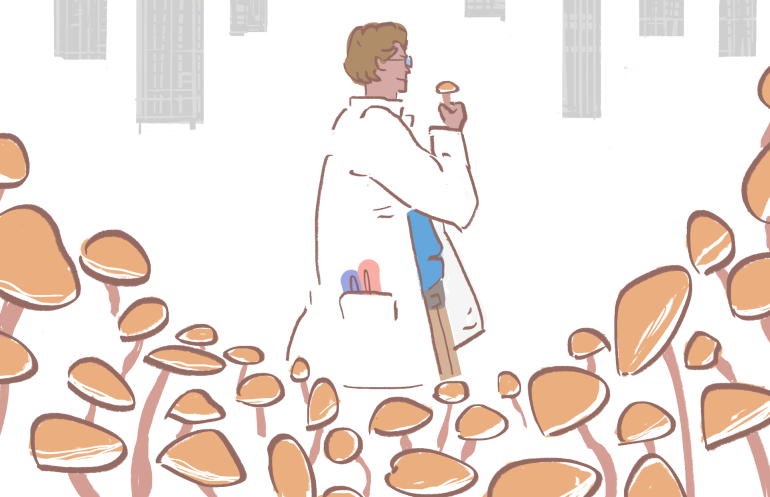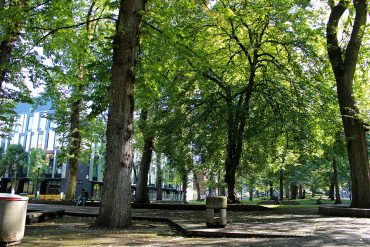The unhoused persons epidemic in Portland appears to stem from three underlying issues: drug addiction, mental illness, and housing affordability. The former two tendencies are referred to as disabling conditions, and one study showed that about 70% of those living on the streets, and in shelters, report being afflicted by one or both. When a person suffers from both drug addiction and mental illness, they are what is called “dually diagnosed”, and have a harder time seeking treatment for and recovering from either, since most facilities and counselors are ill-equipped to assist them. It often seems hopeless, that there is no solution to this growing problem, but recently, there was introduced a new possible solution: psilocybin assisted therapies.
Passed in November 2020, Oregon Ballot Measure 109—legislation driven by an unprecedented wave of petition signatures—has made the research for psilocybin’s efficacy in treating both mental health and addiction possible. Psilocybin is a psychoactive chemical naturally occurring in several species of mushroom. It has shown great promise in studies conducted by organizations such as Multidisciplinary Association for Psychedelic Studies (MAPS).
The Oregon Psilocybin Services, a department of the Oregon Health Authority, will implement a trailblazing program where trained facilitators will guide people suffering from the disease of addiction on a brand-new path to recovery, one that is spiritually focused, and that targets the spiritual roots of the disease. Applications to become a program facilitator will open on January 2, 2023.
During the past few weeks, a developing story surrounding the Shroom House storefront dominated Portland area news headlines. Since opening on October 24, the business, which offered customers a place to purchase a variety of psilocybin containing mushrooms, gained popularity. It became so popular that at the height of the media hype, there were lines around the block of people hoping to buy their product in a retail setting for the first time within the borders of the United States.
This is just one indicator of people’s interest in attaining psilocybin containing mushrooms. A skeptic would suggest that if crystal meth were suddenly being sold in a retail shop, we would also see scores of people waiting in line, but it would be safe to assume that such clientele would have a very different energy. Shroom House has since been raided and shut down by police, but who’s to say that this isn’t just the first of many calculated legal chess-moves in a long game leading to an end to psilocybin prohibition?
During this last election cycle, gubernatorial candidate Christine Drazan’s running platform included reversing the legislation which decriminalized possession of many illicit substances. While Drazan lost the race, we saw all but eleven Oregon counties ban psilocybin outright. Both of these hot button issues likely reflect the people of Oregon’s attitudes about the causes of the growing number of unhoused people in the state.
In October of 2020, I contracted the Alpha variant of COVID-19. I had all the symptoms, one by one: fever, then fatigue, then chills, then finally, loss of taste and smell. Even after all other symptoms faded, I was still unable to taste or smell anything except salt, mustard, and cinnamon. I had heard stories of people who, after six months, had still not regained those senses, and I was becoming concerned that I might not either.
As Thanksgiving approached, I lamented over the possibility of never tasting mashed potatoes and stuffing, or smelling turkey cooking, ever again. Though compared to societal issues with which we’d been struggling at large, my personal loss of sense was trivial, COVID’s impact on my life weighed heavy on my mind. Then one day, I decided to take a threshold dose of psilocybin mushrooms—about one gram. When the effects of the psilocybin took hold, I realized how much psychic energy I’d been spending on the coronavirus since its arrival into the zeitgeist. I decided then, to stop thinking about it so much; I felt a wave of relief, and a deep gratitude to the psilocybin.
In the past, I have struggled with addiction, and was afforded a similar freedom from drug use by way of psilocybin. In that moment, days before Thanksgiving, I began to ponder the impacts of the recent decriminalization of addictive substances. I envisioned a mass migration of addicts to Oregon, seeking refuge from the law in a sanctuary where they could use without threat of incarceration. I envisioned them hitting their spiritual rock-bottoms and reaching out for help, where they will be welcomed into the new experimental psilocybin-assisted recovery therapies. I envisioned those therapies working on unprecedented levels, creating stronger spiritual foundations for recovering addicts. I saw recovered addicts reintegrating into society with a powerful new resolve. Oregon might foster a new renaissance of recovery, paving the way for the rest of the United States. I saw hope for the future.
I regained my senses of taste and smell the next day.
You can stay updated on all things related to the program at Oregon.gov’s page on Psilocybin Services.





